Related Research Articles

The history of the Pacific Islands covers the history of the islands in the Pacific Ocean.

Tokelau is a dependent territory of New Zealand in the southern Pacific Ocean. It consists of three tropical coral atolls: Atafu, Nukunonu, and Fakaofo. They have a combined land area of 10 km2 (4 sq mi). In addition to these three, Swains Island, which forms part of the same archipelago, is the subject of an ongoing territorial dispute; it is currently administered by the United States as part of American Samoa. Tokelau lies north of the Samoan Islands, east of Tuvalu, south of the Phoenix Islands, southwest of the more distant Line Islands, and northwest of the Cook Islands.
Tokelau may refer to:
Tokelauan is a Polynesian language spoken in Tokelau and historically by the small population of Swains Island in American Samoa. It is closely related to Tuvaluan and is related to Samoan and other Polynesian languages. Tokelauan has a co-official status with English in Tokelau. There are approximately 4,260 speakers of Tokelauan, of whom 2,100 live in New Zealand, 1,400 in Tokelau, and 17 in Swains Island. "Tokelau" means "north-northeast".
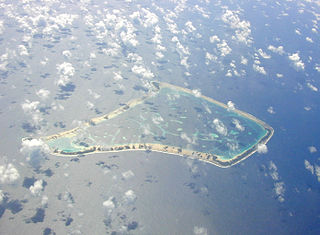
Fakaofo, formerly known as Bowditch Island, is a South Pacific Ocean atoll located in the Tokelau Group. The actual land area is only about 3 km2, consisting of islets on a coral reef surrounding a central lagoon of some 45 km2. According to the 2006 census 483 people officially live on Fakaofo. Of those present 70% belong to the Congregational Church and 22% to the Catholic Church.
Afā is an aitu or supernatural being in the Polynesian mythology of Tokelau.
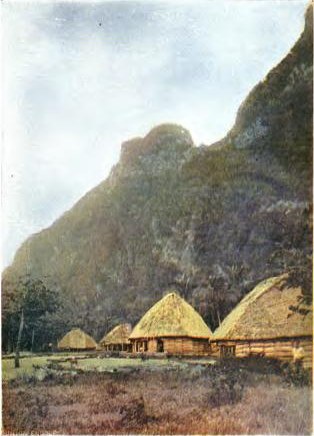
The islands of Samoa were originally inhabited by humans as early as 850 BC. After being invaded by European explorers in the 18th century, by the 20th and 21st century, the islands were incorporated into Samoa and American Samoa.
Tu'i, also spelled more simplistically Tui, is a Polynesian traditional title for tribal chiefs or princes. In translations, the highest such positions are often rendered as "king". For details, see the links below various polities. Traditionally, a Tui is an equivalent of God title. Origin of Tui is believed to be Tui Manu'a.

The Roman Catholic Mission Sui Iuris of Tokelau in Tokelau is a suffragan mission of the Roman Catholic Archdiocese of Samoa-Apia. It was formed in 1992 when the Archdiocese of Samoa-Apia and Tokelau was split into the Archdiocese of Samoa-Apia and the Mission Sui Iuris of Tokelau. The position of Ecclesiastical Superior is currently vacant following the death of Archbishop Alapati Lui Mata’eliga on 25 April 2023.

The following outline is provided as an overview of and topical guide to Tokelau:

The title Tui Manuʻa was the title of the ruler or paramount chief of the Manuʻa Islands in present-day American Samoa.
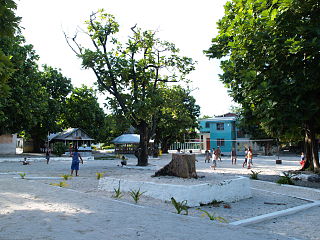
Fakaofo is a village on Fakaofo atoll in Tokelau. It is located to the north-west of the atoll. It is notable for its monument which is a coral slab personifying Tui Tokelau, a god once worshipped in the islands.

Foua Toloa was a Tokelauan politician who served as the Head of the Government of Tokelau, or Ulu, from 21 February 2009, to 21 February 2010. He was a member of the Council for the Ongoing Government of Tokelau, and was a faipule on Fakaofo. As the office of Ulu rotates on an annual basis, Toloa resumed office on 21 February 2011. For a time in 2011-2012, he was also Tokelau's minister for Finance, Telecommunication, Energy and Transport.
The following is an alphabetical list of articles related to Tokelau.
Tui Fiti or Tuifiti is the name of a figure referred to in different legends in Samoan mythology and in other parts of Polynesia. In other stories, "Tui Fiti" means "high chief of Fiti."
Sikaiana is a Polynesian language, spoken by about 730 people on Sikaiana in the Solomon Islands.

The vast majority of people in Tokelau are Christians and Christianity plays a significant role in the Tokelauan way of life.
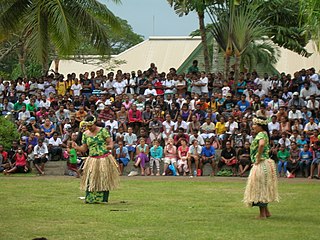
Tokelauan people are a Polynesian ethnic group native to Tokelau, a Polynesian archipelago in the Pacific Ocean, who share the Tokelauan Polynesian culture, history and language.
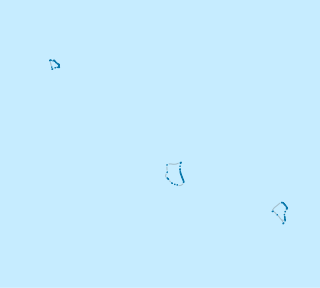
The COVID-19 pandemic in Tokelau is part of the ongoing worldwide pandemic of coronavirus disease 2019 caused by severe acute respiratory syndrome coronavirus 2. Tokelau reported its first confirmed case on 21 December 2022. COVID-19 reached all three of Tokelau's main atolls in July 2023, when the government confirmed the community spread of the virus on Fakaofo, the last atoll without infections.

The Western Polynesian tropical moist forests is a tropical and subtropical moist broadleaf forests ecoregion in Polynesia. It includes Tuvalu, the Phoenix Islands in Kiribati, Tokelau, and Howland and Baker islands, which are possessions of the United States.
